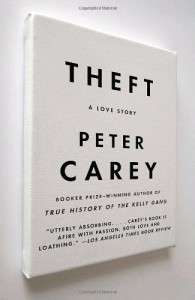Take one ex-famous painter, Lenny from Of Mice and Men, and Amy Dunne from Gone Girl. Shake well and see what happens. Apparently, Theft is what happens.
Michael “Butcher” Boone has had a string of bad luck. He was once a celebrated artist – in Australia, anyway – but his star is on the wane. He had a messy divorce, lost custody of his young son, and was jailed after trying to steal back his paintings from his ex-wife. Now, thanks to one of his collectors, Butcher is the unpaid caretaker for a country house where he also has to look after his “damaged” younger brother, Hugh.
The narrator for most of the book, Butcher is a selfish egotistical son of a bitch, and he freely admits to it. In one of the funniest passages, his patron shows off the house’s studio, complete with expensive coachwood flooring. Immediately afterwards, Butcher buys plywood and fixes it on top of the coachwood with Sheetrock screws. He doesn’t do this out of malice; it’s just that “it could not work the way it was.” We also see his frustration with Hugh, whose disability checks he spends on paint and alcohol.
It’s never explicitly stated what is wrong with Hugh, who narrates every third chapter. He has a disregard for personal hygiene, does not know his own strength, and is happy to just sit on his folding chair and people-watch. But while Hugh may be simple, he is not stupid. Although he depends on Butcher for care, he resents his brother’s egotism and seems to delight in his downfall: “One minute you are a NATIONAL TREASURE with a house in Ryde and then you are a has-been buying Dulux with your brother’s DISABILITY PENSION.”
One stormy evening, the Boones are visited by the lovely, enigmatic Marlene. She is the wife of Olivier Leibovitz, the only son of famous Cubist painter Jacques Leibovitz. Thanks to her marriage, Marlene is a holder of the droit moral, the right to authenticate paintings said to be by Leibovitz. Butcher and Hugh’s neighbor owns one such painting, and soon after Marlene confirms it is genuine, it is stolen. When suspicion falls on Butcher, Marlene comes to the rescue by offering him a show in Japan. Completely smitten, Butcher follows her first to Tokyo, then to New York City. There is clearly something fishy going on. But who is scamming whom? And why?
Both Hugh and Butcher fall for Marlene, but the “love story” of the title is that between the two brothers. The entire art-heist plot serves as a backdrop for their relationship, and despite their mutual resentment, there is also love, loyalty, and even moments of selflessness. It’s all very sweet. However, the overarching plot is often lost in favor of Butcher or Hugh detailing what is happening here and now. Between one’s self-absorption and the other’s confusion, the presentation of events is very limited.
In Oscar and Lucinda and True History of the Kelly Gang, Peter Carey evoked a sense of place and time beautifully. In Theft, we know we are in Japan because (1) Butcher says so and (2) there are lots of businessmen eating sushi. That’s it. Also, when writing in Hugh’s voice, Carey makes some stylistic choices that I personally hate. For instance, Hugh says of another character that “the skin of his eyelids was soft as a penis freshly bathed.” Erm, what? I don’t think people actually talk like that. Maybe I should stick to Carey’s period pieces.

